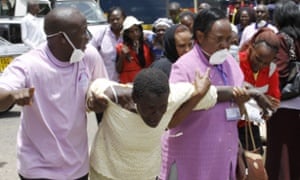On The Guardian:
Kenya launches air strikes against al-Shabaab camps in Somalia
Military says jets have bombed two camps in border region in response to massacre of students at Garissa University
Murithi Mutiga in Nairobi and agencies
Monday 6 April 201514.20 BST

Fighter jets have bombed two al-Shabaab camps in southern Somalia, Kenyan officials said on Monday, as more details emerged of the model-student-turned-jihadi who took part in a massacre that left 148 dead.
In the first major military response to last week’s attack by the militant group on Garissa University, jets hit what were described as al-Shabaab camps in two villages in the Gedo region of southern Somalia, close to the border with Kenya.
A spokesman for the Kenyan military, Colonel David Obonyo, said the al-Shabab camps which were used to store weapons and for logistical support were destroyed, but it was not possible to determine the number of casualties because of poor visibility.
The bombings, which followed President Uhuru Kenyatta’s promise to retaliate in “the severest way possible” to the attack, in which dozens of cowering students were lined up and shot in the head at close range, came as a government source told Reuters that governors, members of parliament and security officials from regions bordering Somalia would compile a list of people suspected to have joined al-Shabaab or been radicalised by Islamists.
“The message is very clear: we have to deal with this problem once and for all,” said the official, adding that regional governors had discussed the idea with Kenyatta on Monday.
Hawa Yusuf, who lives in a village near the town of Beledhawa that is close to the Kenyan-Somali border, said the Kenyan warplanes “were hovering around for a few minutes, then started bombing.” She didn’t know if there were any casualties, she said by phone. Another resident of the village, Ali Hussein, said the airstrikes hit a grassland “where nomads often take their animals for grazing.”
As Kenya began the second of three days of national mourning, meanwhile, people digested the shock identity of one of the gunmen.
Abdirahim Abdullahi – whose name was first revealed by the Kenyan journalist Yassin Juma on his blog and later confirmed by Kenyan authorities – was described by friends as a “brilliant, upcoming lawyer” and an A-grade student who took a mysterious turn to radical Islam at some point between school and university.
Abdullahi was the son of a chief – a Kenyan government official whose job includes identifying criminals to the police and arbitrating in local disputes.
Friends described the gunman, who had secured an internship at a major bank that recruits many Muslim graduates, as a bright student who began to show signs of radicalisation during his college studies, even as he gave motivational lectures to high-school pupils.
“He used to make the students laugh with his words, quoting wise people and motivate them to do the best they can. He was the perfect lawyer. He had his way with people,” a former student said.
One student described a conversation with Abdullahi and another of his former schoolmates Mohamed Atom, who is the only Kenyan known to have joined Islamic State in Syria, after one of its motivational lectures.
He told the Sahan Journal website that the lawyer-turned-jihadi and his friend spoke of the futility of western education and repeatedly brought up the question of dying to advance the cause of religion.
“After the lecture, they kept talking about how secular education was not useful,” said a previous student who engaged him afterwards. “He kept saying: ‘We need to strengthen our connection with Allah. It is the knowledge of Islam that will only be useful to you today and in the hereafter.’”
Alarmed by the prospect of more Kenyans returning from jihadi training camps to take part in terror atrocities, the authorities urged relatives whose children had disappeared to come forward.
“It is indeed very necessary and critical that parents whose children go missing or show tendencies of having been exposed to violent extremism report to authorities to help prevent further escalation of radicalisation”, Mwenda Njoka, an interior ministry spokesman, told the Standard newspaper.
The Garissa attack came amid a debate about Kenya’s involvement in a UN-backed, African Union troop mission to tackle al-Shabaab in Somalia.
Although the Kenyan military has enjoyed considerable success on the battlefield, taking few casualties and pushing the terror group from most populated centres in southern Somalia, the mission has come at the cost of more than 400 Kenyan lives.
Al-Shabaab, which at one point controlled most of Somalia, has lost swaths of territory in recent years but diplomats have repeatedly warned this has not diminished its ability to stage guerrilla-style attacks at home and abroad.
It has threatened to turn Kenyan cities “red with blood” and police have stepped up security at shopping malls and public buildings in the capital, Nairobi, and in the eastern coastal region, which is popular with tourists and has been prone to attacks.
Read here:
No comments:
Post a Comment